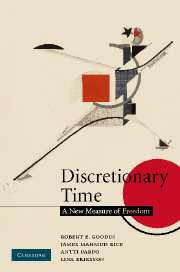Book contents
- Frontmatter
- Contents
- List of figures
- List of tables
- Preface
- Part I Introduction
- 1 Time and money
- 2 Discretionary time and temporal autonomy
- 3 The distribution of discretionary time
- Part II Time pressure
- Part III Welfare regimes matter
- Part IV Gender regimes matter
- Part V Household regimes matter
- Part IV Conclusions
- Appendix 1 Methodology
- Appendix 2 Data
- Bibliography
- Index
1 - Time and money
Published online by Cambridge University Press: 28 October 2009
- Frontmatter
- Contents
- List of figures
- List of tables
- Preface
- Part I Introduction
- 1 Time and money
- 2 Discretionary time and temporal autonomy
- 3 The distribution of discretionary time
- Part II Time pressure
- Part III Welfare regimes matter
- Part IV Gender regimes matter
- Part V Household regimes matter
- Part IV Conclusions
- Appendix 1 Methodology
- Appendix 2 Data
- Bibliography
- Index
Summary
Time matters
Recent theorizing about politics has been characterized by a quest for an appropriate ‘currency of egalitarian justice’. Time has some very special properties that combine to make it a particularly apt candidate for that status.
Time is inherently egalitarian. Everyone has just 24 hours in a day. Some people may value time more than others. Still, an hour is the same for everyone, everywhere. That makes it a natural metric for social comparison.
Time is inherently scarce. No one has more than 24 hours in a day. Some people's projects are more time-consuming than others', and some people's lives last longer than others'. Still, virtually everyone agrees that more time would be better. That makes time a resource that is always scarce relative to demand.
Time is a necessary input into anything that one cares to do or to become. Some people make better use of their time than others, getting more done in the same amount of time. Still, everyone needs some time to do or become anything. That makes time a universal good.
Those facts combine to make ‘time’ a particularly apt currency for egalitarian justice.
What we ought to be concerned with, more precisely, is the just distribution of control over the resource of ‘time’. When we say that someone ‘has more time’ than someone else, we do not mean that she has literally a twenty-fifth hour in her day.
- Type
- Chapter
- Information
- Discretionary TimeA New Measure of Freedom, pp. 3 - 26Publisher: Cambridge University PressPrint publication year: 2008



